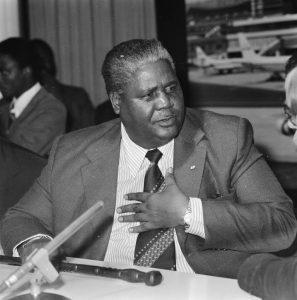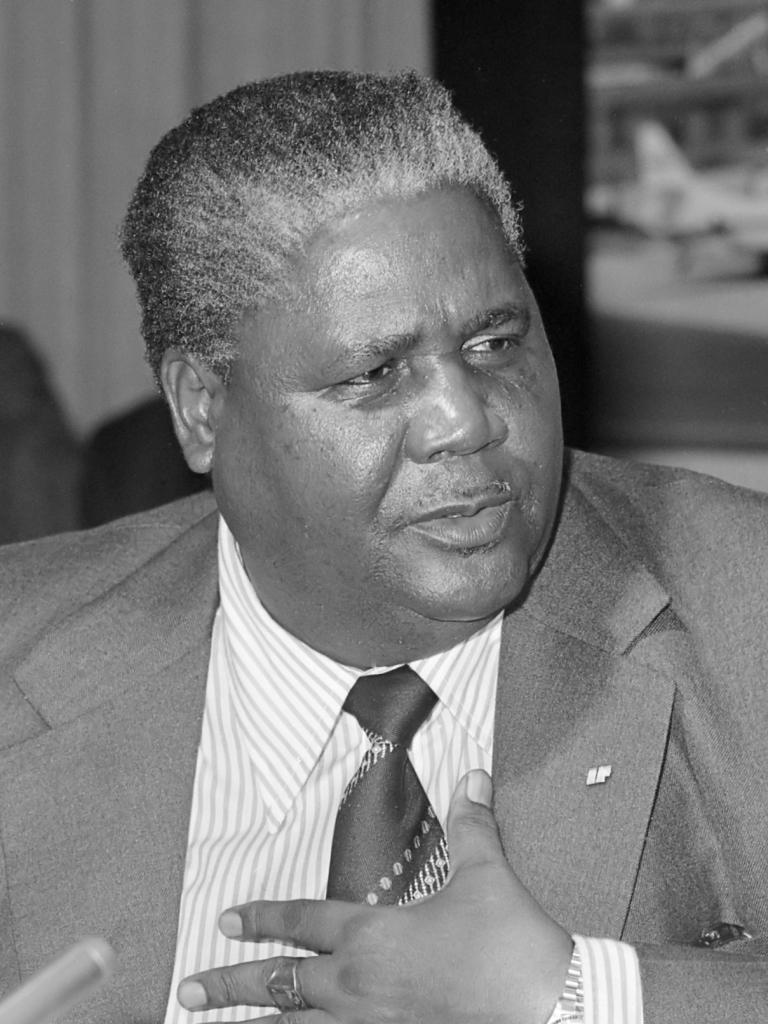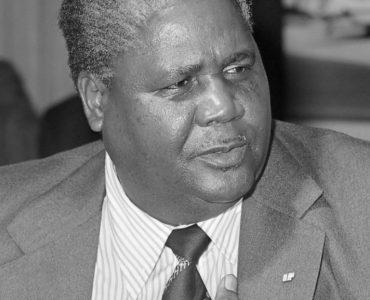Joshua Mqabuko Nyongolo Nkomo (19 June 1917 – 1 July 1999) was a Zimbabwean freedom fighter and politician who served as Vice-President of Zimbabwe from 1990 until his death in 1999. He founded and led the Zimbabwe African People’s Union (ZAPU) from 1961 until it merged in 1987 with Robert Mugabe’s Zimbabwe African National Union (ZANU) to form ZANU–PF. He is the father of Zimbabwean Liberation struggle!
He was a leading trade union leader, who progressed on to become president of the banned National Democratic Party, and was jailed for ten years by Rhodesia’s white minority government. After his release, ZAPU contributed to the fall of that government, but then feuded with the splinter rival ZANU group created and led by Robert Mugabe after expulsion from ZAPU.
 Nkomo was born on 19 June 1917 in Matopos, Matabeleland, Southern Rhodesia to a poor Ndebele family. He was one of eight children. His father (Thomas Nyongolo Letswansto Nkomo) worked as a preacher and a cattle rancher and worked for the London Missionary Society. His mother was Mlingo Hadebe.
Nkomo was born on 19 June 1917 in Matopos, Matabeleland, Southern Rhodesia to a poor Ndebele family. He was one of eight children. His father (Thomas Nyongolo Letswansto Nkomo) worked as a preacher and a cattle rancher and worked for the London Missionary Society. His mother was Mlingo Hadebe.
After completing his primary education in Southern Rhodesia, Nkomo took a carpentry course at the Tsholotsho Government Industrial School and studied there for a year before becoming a driver. He later tried animal husbandry, then became a schoolteacher specialising in carpentry at Manyame School in Kezi. In 1942, at the age of 25, during his career as a teacher, he decided that he should go to South Africa to further his education.
After returning to Bulawayo in 1947, he became a trade unionist for black railway workers. Railway Workers Union and then to leadership of the Southern Rhodesian chapter of the African National Congress in 1952 (later the Southern Rhodesia African National Congress). In 1960 he became president of the National Democratic Party, which was later banned by the Rhodesian government.
Nkomo was detained at Gonakudzingwa Restriction Camp by Ian Smith’s government in 1964, with fellow outlaw rebels Ndabaningi Sithole, Edgar Tekere, Enos Nkala, Maurice Nyagumbo, Robert Mugabe, until 1974. Following Nkomo’s release, he went to Zambia to continue opposing the Rhodesian government through the dual processes of armed resistance and negotiation. Unlike ZANU’s armed wing – the Zimbabwe African National Liberation Army, ZAPU’s armed wing – the Zimbabwe People’s Revolutionary Army – was dedicated to both guerrilla warfare and conventional warfare.
Nkomo founded the National Democratic Party (NDP) and, in 1960, Robert Mugabe joined him. The NDP was banned by the white minority government and it was subsequently replaced by the Zimbabwe African Peoples Union (ZAPU), also founded by Nkomo, in 1962, itself immediately banned. ZAPU split in 1963 and while some have claimed this split was due to ethnic tensions, more accurately the split was motivated by the failure of Sithole, Mugabe, Takawira and Malianga to wrest control of ZAPU from Nkomo. ZAPU would remain a multi-ethnic party right up until independence.
Following the first majority-rule election in Zimbabwe-Rhodesia in which around 60% of the population voted, a government led by Abel Muzorewa, was formed in 1979 between Ian Smith and Ndabaningi Sithole’s ZANU Mwenje, which by now had also split from Mugabe’s more militant ZANU faction. The civil war waged by Nkomo and Mugabe continued unabated and Britain and the USA did not lift sanctions on the country. Britain persuaded all parties to come to Lancaster House in September 1979 to work out a constitution and the basis for fresh elections. Mugabe and Nkomo shared a delegation, called the Patriotic Front (PF), at the negotiations chaired by Lord Carrington. Elections were held in 1980 and to the surprise of Nkomo but few others, the Common Roll vote split on predictable tribal lines, with the 20 seats in Matabeleland going to ZAPU (listed as “PF–ZAPU”) and all but three of the sixty in predominantly Shona areas falling to Mugabe’s ZANU–PF.
Despite reaching their ultimate goal, ousting Smith’s minority regime, Nkomo could not reconcile his differences with Mugabe. While ideological differences kept the two men apart far enough to begin with, Nkomo’s ethnic background was grounds for additional distrust by Mugabe who constantly feared an uprising by the historically turbulent Ndebele population. Nkomo would make concessions and attempts to improve relationships but met with varying results, the most successful being the ones where Sally Hayfron would intervene, as she was the only person within Mugabe’s party who was supportive of Nkomo.
In 1987 Nkomo consented to the absorption of ZAPU into ZANU, resulting in a unified party called ZANU-PF, leaving Zimbabwe as effectively a one-party state and leading some Ndebeles to accuse Nkomo of selling out. These Ndebele individuals were in such a minority that they did not constitute a meaningful power base within ZAPU. As part of the deal, Nkomo became vice-president when the constitution was amended to create a second vice-president in 1990. He was sworn in as vice-president on 6 August 1990. In practice, the post was almost powerless. With his health failing, his influence declined.
Nkomo married his wife Johanna in 1949. They had four children: Thandiwe Nkomo, Ernest Thutani, Michael Sibangilizwe, and Louise Sehlule. Nkomo died of prostate cancer on 1 July 1999 at the age of 82 in Parirenyatwa Hospital in Harare.


